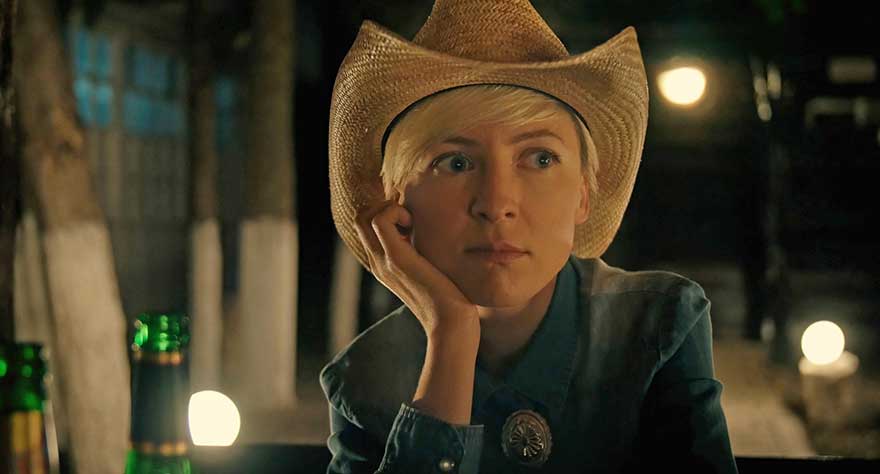
Fantasy and reality blur on multiple levels in this uneven arthouse film posing as a documentary.

Fantasy and reality blur on multiple levels in this uneven arthouse film posing as a documentary.
One of the great joys for fans of true independent documentary filmmaking is having the chance to hear stories that might not otherwise be told. High-profile documentaries are great, and those stories need to be heard as well, but for every flashy doc there are countless other docs that offer unique glimpses into unknown lives, uncharted worlds, and times that have long since passed. Such is the story of Hotel Dallas from Livia Ungur, who acts as co-writer and co-director on a film about her own experiences.
As the 1980s wound down, Romanian dictator Nicolae Ceaușescu recognized that the people oppressed under the boot of his Communist tyranny were growing restless and itching for freedom. In a placating move, Ceaușescu allowed the state-run television station to air reruns of America’s wildly popular drama Dallas. The prime-time soap starred Larry Hagman as evil oil tycoon J.R. Ewing and Patrick Duffy as his much kinder brother, Bobby. So popular did the show become in Ceaușescu’s corner of the Eastern Bloc, an entrepreneurial individual modeled a building after the home of the Ewings’ fictitious Southfork Ranch and turned it into a hotel, where guests could temporarily pretend they were living in 1980s Dallas.
While it’s technically accurate to call Hotel Dallas a documentary, the term both oversells and undersells the film, a juxtaposition that offers an interesting opportunity for Ungur (and her co-creator/husband Sherng-Lee Huang), but one that hampers the work as a whole.
From the oversell perspective, Hotel Dallas offers less in the way of what a viewer might expect in a documentary set in this place and time. While the filmmakers properly frame the geopolitical landscape so the importance of the TV show to oppressed Romanians is clear, there isn’t a great amount of interest from the filmmakers in exploring it too deeply. There are some fine voiceover testimonies to be heard from people who lived there and then, and it’s clear the show was a godsend to those people (and perhaps something of a backfire on Ceaușescu), but they are only soundbites offering a sketch, not narratives offering a complete picture.
This is where calling it a documentary somewhat undersells the film, as it is far more artistically experimental than the average documentary, with parts of the film delving into everything from philosophical oppression to complete fantasy.
The highlights of this avant-doc portion of moviemaking are three scenes played out by Romanian child actors dressed as Pioneers—Romania’s Communist youth organization. In one scene, the kids reenact the death of Bobby Ewing as seen on TV (something Ungur admits to being traumatized by when she was a child). In another scene, Bobby Ewing is “reborn,” a moment taken from Dallas‘ now-infamous shower episode. In the third scene, and in keeping with themes of life and death, the children replay the Christmas execution of Ceaușescu and his wife, Elena—a chilling moment in stark monochrome, especially as performed by youngsters. There is also the chance to see an old Romanian oil company commercial starring Larry Hagman.
But the most fascinating artistic piece is the inclusion of Patrick Duffy himself throughout the entire film. He plays a character named Mr. Here (with a clever comic reason behind the name), but he channels his Bobby Ewing persona as if it were in a constant state of semi-consciousness. He is only seen onscreen once (in a recording studio scene that is slickly edited), and the rest of his “appearances” are voiceover, but from his POV. His purpose in the film is to bridge the gap between Hollywood fantasy and Romanian reality, along with bridging the time between Ungur’s modern-day existence and her Romanian youth. The pair actually travel back in time throughout the length of the film.
While some of the filmmaking is quite good when being judged on its own merits, the blending of documentary and drama becomes too cute by half. Even if every scene was good, the filmmakers don’t quite have the skills to pull off something this audacious. Using fantasy to tell the truth, or injecting the truth with fantasy to make a point, is tricky, and too often I found myself wondering what was real and what wasn’t, a question a viewer shouldn’t have when watching something that presents itself as factual. The filmmakers’ raw talent here is evident, but it’s unfocused. The facts are interesting, and the artistic choices are compelling, but the two aren’t meaty enough to work together very well.